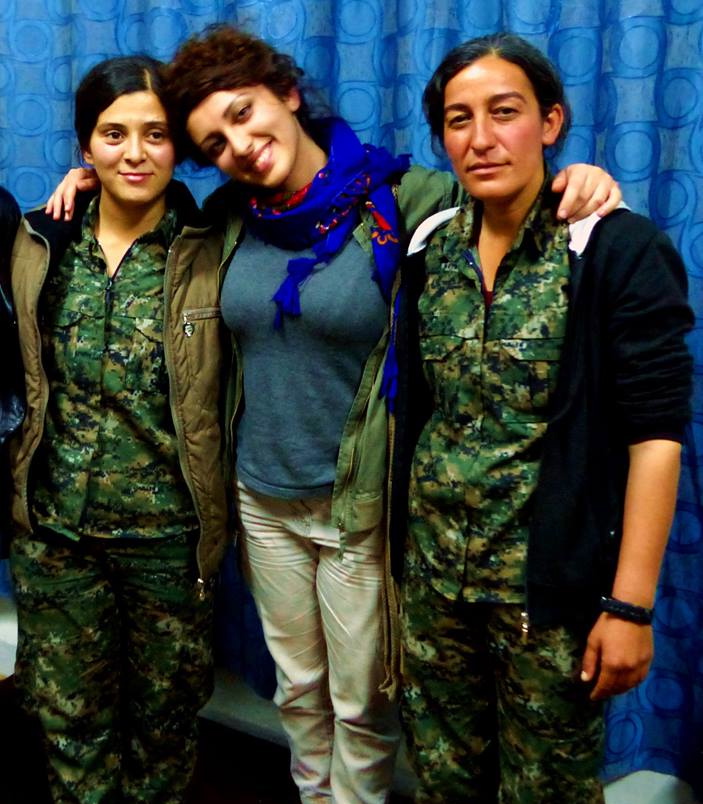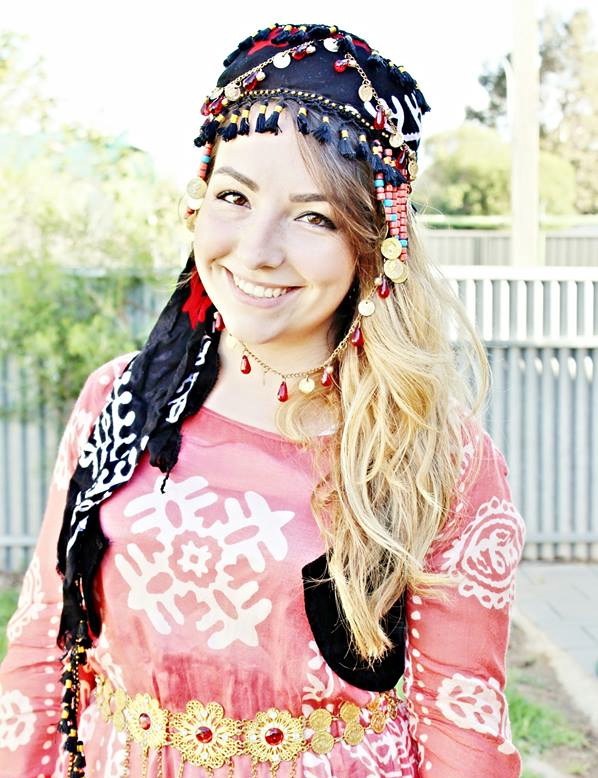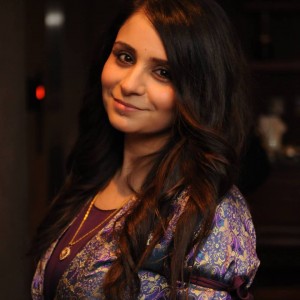Celebrating Kurdish Women: ‘Today, They Rewrite Their Own History’
Today, people are celebrating International Women’s Day. To some it is a day to celebrate women like Mother’s Day but to others it is a day to mark women’s past, present and future struggle to achieve empowerment and equality with men.
This year’s international theme is “Make it happen” and in Kurdistan, the women are doing just that.
They are fighting in the face of the oppressive Turkish, Iranian and Syrian regimes and the inhumane terrorist group Islamic State straddling Syria and Iraq while battling the patriarchal traditions and notions of their own society.
In an effort to raise awareness about the Kurdish women movement I asked Kurdish rights activists Dilar Dirik, PhD student focusing on the Kurdish women’s movement, Tara Fatehi, spokesperson for the Kurdistan Human Rights Network and Lawen Azad, former journalist to talk about women’s rights in West Kurdistan/Rojava (Kurdish regions in Syria), East Kurdistan (Kurdish regions in Iran) and South Kurdistan (Kurdistan Regional Government in Iraq), respectively.
A True Revolution
“Kurdish women have been marginalized and oppressed by so many factors, be it states, their own community or their intimate family – they had long been forgotten and written off among the many wretched and invisible beings in world history. The women in Rojava were even unnoticed among many Kurds. Just when they lost everything, like phoenixes, they magnificently emerged out of their ashes and today, they are seen as fearless torches of freedom by millions of people. But unlike phoenixes, they do not want to be trapped in a circle that perpetuates their old state of existence. They will not return to being ashes. They are now setting their own terms of existence and communalize their struggle. They speak autonomously on their own behalf. They will not remain silent even if this means to challenge their own community and family. This may sound like romanticism, but considering the social realities of Kurdistan, the Middle East, and the whole world, this women’s struggle is true revolution in every sense. This is a source of pride. But not the meaningless kind of pride for belonging to a random community. It is a pride in labor, achievement, insistence, struggle, resistance, sacrifice, and revolution. Kurdish women have always been defined and essentialized by others. Today, they rewrite their own history.”
“The resistance we see in Rojava today, and along with that, their insistence on women’s liberation, has deep roots, although most people barely began to notice it a few months ago. Such an organized focus on women’s liberation would not have been possible without solid ground to stand on.”
“Unlike many other uprisings which took place over the last couple of years, Rojava decided not to leave social issues to an indefinite time after the revolution, but designed its understanding of freedom as every-day revolution in the form of lived practice. And it is explicitly centered around women’s liberation. Hence, while the women fight alongside men, they also create a new society. This manifests itself in all spheres of Rojava’s political and social structure, but is often ignored by many.”
“Of course the liberation of Rojava in 2012 was a golden opportunity but the people already had a solid ideological and organizational base to build on. They did not achieve this simply by virtue of being Kurdish women. They were extremely politically conscious and a bitter decades-long struggle prepared the ground for this.”
“A YPJ (Women’s Protection Units) commander in Amûde said: “We are not just women fighting against ISIS. And we don’t want the world to know us for our guns, but for our ideas”. And when she described the philosophy and meaning behind the character of Rojava’s revolution, especially from the perspective of women’s liberation, she pointed at Abdullah Öcalan’s philosophy just like everyone else in the YPJ. It is impossible to treat this commitment to women’s liberation in isolation from the legacy of the PKK in the region.”
We don’t want the world to know us for our guns, but for our ideas
“The women in Rojava, through their organized, collective, and principled struggle have rearticulated radical feminism by putting it into direct practice. One of its main strengths is its tackling of social issues such as sexism, racism, economic exploitation, education, assimilation, state violence, etc. simultaneously without thinking about different forms of oppression in a hierarchical manner. It is truly a grassroots movement, extremely diverse and accessible to all.”
“One needs to realize the radicalism that swings between the two fingers raised to the victory sign by elderly women in colorful robes with traditional tattoos on their faces. That these women now participate in TV programs, people’s councils, the economy, that they now learn to read and write in their own language, that, once a week, a 70-year old woman recites traditional folk tales at the newly established Mesopotamia Academy of Social Sciences to challenge the history-writing of hegemonic powers and positivist science, is a radical act of defiance against the former monist regime, because rather than replacing the person on top, it refuses the parameters of the system altogether and constructs its own standards. In a time in which violence against women is increasingly on the rise around the world, they made a clear case for women’s self-defense. Today, women around the world now actively engage with the philosophy that drives women in Rojava.”
Simplifying A Complex Struggle
Western media are fascinated with the Kurdish female fighters battling the Islamic State which has resulted in everything from positive articles, fashion editorial-like pictures in Marie Claire to critical blogs pointing out that Kurdish female fighters are not pioneers. I asked Dilar what she thought about this.
“There are several dimensions to this. First, it is hard for orientalist eyes to conceive of active and militant Middle Eastern women. Secondly, women who fight are a taboo everywhere in the world because they break with traditional social roles. And third, some people seem to think this is a good way of “degrading” ISIS – the classical girl beats boy joke, which is of course problematic. Though it is amazing to see the women’s struggle get attention for the first time, it is unfortunate that the way it is treated is so simplistic. The media cleverly takes the politics, philosophies, and demands of these women out of the equation because it fails to understand the meaning of this radical undertaking. Further, due to the PKK’s terror listing and Turkey’s strategic importance, everyone conveniently leaves out the fact that the people who fight in Rojava explicitly say that they subscribe to the political ideology of the PKK.”
“It is quite problematic to cherry-pick the things we like about women fighters in Rojava. Not last because it means to instrumentalize their courage, but also because it avoids pressing questions about the system in which we live in that labels the thoughts of these women as terrorist.”
Leading The Struggle
The situation is different for the Kurdish women’s movement in Iran, Tara Fatehi points out.
“The women of and in Rojhelat differ greatly to those in the other regions of Kurdistan due to two major points. One is the occupation of the region by an Islamic republic and the other the diverse nature of political activity or lack thereof in the region. Although patriarchy is a very large problem throughout the Middle East it is greatly poignant in Iran due to the rules and regulations of the Islamic Republic of Iran which follows its own version of a sharia law and/or Islamic law. Kurdish women are not only left to deal with the burden of their ethnicity but also their sexuality.”
“I don’t think men anywhere, in general or as a whole, have ever prioritized women’s rights. I do believe however, that East Kurdistan has always been a leading role model of promoting and struggling for the rights of women in face of both society and tyrant regimes.”
“Kurdish female Peshmerga (Kurdish soldiers) fought alongside their male counterparts dating back to the time of the Shah in Iran. The Kurdish women’s struggle only intensified after the Islamic republic took over and women become its first victim.”
“30 years later we see our women fighting against ISIS. Many embedded with YPJ but also many who are still fighting with their traditional forces (PDKI & Komala) but unfortunately they become lost among the hype of the media.”
“It must be made clear that these achievements did not come about due to the prioritization of their rights by men; it came about because they fought for them. They struggled and many paid the ultimate price for their resistance. The YPJ rose in the face of one of the biggest terrorist organisations of our time – but Kurdish women in East Kurdistan rose against a government version of ISIS more than three decades ago. Women held and still hold senior positions within the Kurdish political parties and their forces. There are many stories of incredible women commanders who lead battles – all lost within generations of continued struggle against Iranian regime. Their struggle may not be as sexy to the media, but it is no different to those fighting in other regions of Kurdistan.”
Fighting Two Battles
I asked Tara what kind of change the Kurdish women of East Kurdistan can bring about.
“I like to look at the struggle of Kurdish women in East Kurdistan through two channels: Visible and invisible. The visibility of Kurdish women in Iran comes from the fact, believe it or not, that ALL women in Iran are oppressed regardless of their ethnicity. On the world stage and in both media outlets and human rights organisations we can see that there has been many efforts and campaigns to create greater awareness of the plight of women in Iran, therefore making them and their plight a visible one.”
“For example, the world media and Iranian women’s rights activists saw great hope when Rouhani was elected as the new president in Iran. Activists outlined what the government need to do to improve the situation of women. Women were highlighted here however they completely neglected the rights of minorities and the struggle of women from minorities living under the Iranian regime.”
“Activists should be sensitive and aware of issues relating to minority groups in Iran which may not be a blanket problem for all women throughout the country. Issues that should have and could have been pointed out relating to many minority groups, but relating especially to the Kurds are:
-
Higher illiteracy levels in Kurdistan compared to Iran
-
Higher levels of drug dependency in the region
-
Higher levels of inter-family marriages/and or forced marriages
-
Higher levels of domestic violence/honours killings
“This comes through the neglect of those regions and is defiantly a political tactic of oppression and assimilation. The poorer a region is the more illiterate our women and children are and the easier it is to occupy their minds.”
“The invisibility of the Kurdish women in Iran comes from their ethnicity and cultural background. Although this may seem very obvious it usually goes undetected in women’s rights discussions relating to Iran. This point is significant because women from ethnic minorities suffer two layers of discrimination. Firstly due to their ethnicity and secondly due to their gender. This aspect is completely undermined by feminists and women’s rights activists in Iran and the world. In every sense these women are fighting two battles.”
The poorer a region is the more illiterate our women and children are and the easier it is to occupy their minds
“In April last year, Iranian authorities punished a man for a criminal crime by dressing him up in red Kurdish dress and parading him around Mariwan. A statement which led to a worldwide outrage from the international Kurdish community, with many taking to social media sites to show their solidarity with Kurdish women. The act itself was to punish one man but assaulted all women. Especially Kurdish women. Even when reported about in international media the very important point of the aspect of culture, the Kurdish clothes, was completely ignored. Here we see the invisibility of their ethnicities. As many men stood to show their support, Iranian rights activists and feminists stayed quite.”
“The East Kurdistan region, also known as Rojhelat, is one that is invisible or forgotten when focusing on the Kurdish cause alone. Due to the lack of both political and military activity in the region and the rigid state in which occupies it, we as Kurds have suffocated their voices. Unlike South and North Kurdistan, where an autonomous Kurdish government exists and Kurdish (women) politicians are largely involved in parliament, respectively, the Kurds in the east have no political platform. We have also seen the large media, both Kurdish and international, interest of the all women YPJ forces in West Kurdistan.”
“There are no Kurdish women represented in any level of government in Iran and Kurdish opposition parties do not exist within the political sphere and if they do they are all considered ‘terrorist groups’ by Iran. The role of Political Islam in the region is also very often ignored by other Kurdish Women activists; it is difficult to understand, especially as a Muslim, the very significant role Islam has played in the lives of these women. This is more significant in a (now) generation of political prisoners of the Islamic regime, usually being imprisoned, tortured and executed in the name of Islam.”
“Self-proclaimed women’s rights activists must stand up for the rights of all women, in doing so they must understand the individuality and cultural aspects of the women whom they represent. It is not okay to pick and choose your struggles. When it reaches that point individual struggles lose credibility, voice and integrity. This notion, however, can be applied to all Human Rights activists in Iran whom choose to ignore the rights of ethnic minorities in the region.”
Courts Must Improve Enforcement of Law
Lawen Azad emphasizes that while there are laws to protect women in the Kurdistan Regional Government (KRG), implementation and enforcement of law has yet to become efficient.
“Kurdish activists and women in general merely want to live in an environment that prohibits violence towards them and one that does not allow men to abuse with immunity. They want the law to protect them and for society not to shun them. In this regard I refer specifically to victims of human trafficking and sexual abuse. The Anti Domestic Violence Law NO.8 of the KRG is a good step in the right direction and provides women with a number of rights. It protects them against physical and emotional abuse, forced marriage, honor killings and FGM to name but a few. These are all great but implementation is weak. The courts are not specialized in these cases and enforcing the law is difficult but women’s rights activities continue to advocate for better implementation of the law and stronger sentences for the perpetrators.”
“There are many Kurdish men who do support the initiatives of women’s rights organizations and so passionately and genuinely. The KRG holds an annual 16 day campaign in November aimed at eliminating violence against women. In this respect the government is contributing to dealing with the violence carried out against women but of course more needs to be done.”
Islamic State’s assault on and massacre of the Yezidi people in KRG and Iraq in August last year has had incomprehensible consequences for the Yezidi women. According to reports and eyewitness testimonies they have been sold to members of the Islamic State and suffered abuse during the period of captivity. I asked Lawen how women organisations in the KRG are helping the Yezidi women.
“It is hard to know how Yezidi women are dealing with the trauma of having been captives of ISIS. The videos and images that have circulated have been both terrifying and utterly disturbing. To treat women as mere possessions, as cattle to be sold and bought has once again demonstrated how men within this region in general, although it is not limited to the Middle East, view a woman’s worth.”
“Stories of continuous rape and sexual assault, of torture and killings of these women have shocked Kurdish society. But the Kurdish women’s rights organizations have provided some assistance. They have provided many of the families, not just the women, with shelter, clothing and food. In some instances, psychology help has been offered. This is particularly necessary considering their incredibly difficult ordeal.”




Comments are closed.